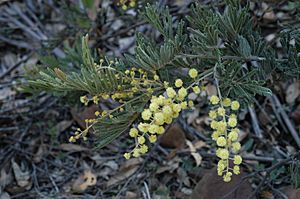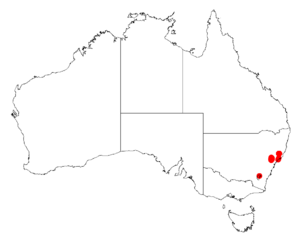Velvet wattle facts for kids
Quick facts for kids Velvet wattle |
|
|---|---|
 |
|
| Scientific classification | |
| Genus: |
Acacia
|
| Species: |
fulva
|
 |
|
| Occurrence data from AVH | |
| Synonyms | |
|
Racosperma fulvum (Tindale) Pedley |
|
The Acacia fulva, also called velvet wattle or soft wattle, is a type of Acacia tree. It grows naturally in eastern Australia.
Contents
What is the Velvet Wattle?
The velvet wattle can grow as a shrub or a tree. It can be anywhere from 1.5 meters (about 5 feet) to 15 meters (about 49 feet) tall.
Bark and Leaves
When the tree is young, its bark is smooth and grey-green. As it gets older, the bark becomes darker, rougher, and has cracks. New parts of the plant are covered in soft, red-brown hairs, which is why it's called "velvet wattle."
The leaves are silver-grey and have a special shape. They are "pinnate," meaning they have smaller leaflets arranged along a central stem, like a feather. Each leaf has 4 to 12 pairs of these smaller stems, called "pinnae." Each pinna is 3 to 7.5 centimeters (about 1 to 3 inches) long. On each pinna, there are 11 to 28 pairs of even tinier leaflets, called "pinnules," which are 3 to 10 millimeters long.
Flowers and Seeds
Velvet wattles bloom from November to June. Their flowers are yellow and grow in round clusters. Each small, round flower head has 20 to 40 individual tiny flowers.
After the flowers, the plant grows seed pods. These pods are tough and leathery, and they are 2 to 12 centimeters (about 1 to 5 inches) long. The seeds inside the pods are ready between April and November.
Where Does the Velvet Wattle Grow?
The velvet wattle likes to grow in soil that comes from sandstone and basalt rocks. These soils have a lot of good nutrients for plants.
It is often found in woodlands. Here, it grows alongside other trees like the forest red gum (Eucalyptus tereticornis), grey box (E. moluccana), and narrow-leaved ironbark (E. crebra). You might also see it with shrubs such as dogwood (Jacksonia scoparia), Exocarpus, Clerodendrum, Clematis, and Senecio.

